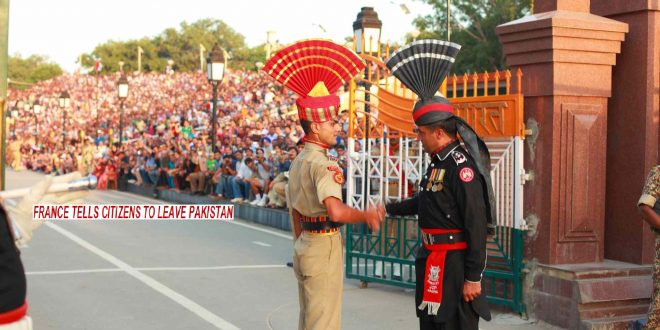15-04-2021
By SJA Jafri + Bureau Report + Agencies
ISLAMABAD/ NEW DELHI/ PARIS: Top intelligence officers from India and Pakistan held secret talks in Dubai in January in a new effort to calm military tension over the disputed Himalayan region of Kashmir, people with close knowledge of the matter have told the Reuters news agency in New Delhi.
Ties between the nuclear-armed rivals have been on ice since a suicide bombing of an Indian military convoy in Kashmir in 2019 was traced to Pakistan-based fighters that led to India sending warplanes to Pakistan.
Later that year, Indian Prime Minister Narendra Modi withdrew Indian-ruled Kashmir’s autonomy in order to tighten his grip over the Muslim-majority territory, provoking outrage in Pakistan and the downgrading of diplomatic ties and suspension of bilateral trade but the two governments have reopened a back channel of diplomacy aimed at a modest road map to normalizing ties over the next several months, the sources told Reuters.
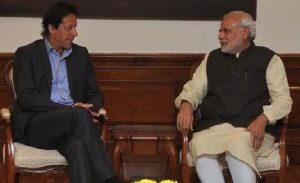 Kashmir has long been a flashpoint between India and Pakistan, both of which claim the entire region but rule only in part.
Kashmir has long been a flashpoint between India and Pakistan, both of which claim the entire region but rule only in part.
Officials from India’s Research and Analysis Wing, the external spy agency and Pakistan’s Inter-Services Intelligence (ISI) travelled to Dubai for a meeting facilitated by the United Arab Emirates government, two people said.
The Indian foreign ministry did not respond to a request for comment. Pakistan’s military, which controls the ISI, also did not respond but Ayesha Siddiqa, a noted Pakistani defence analyst, said she believed Indian and Pakistan intelligence officials had been meeting for several months in other countries.
“I think there have been meetings in Thailand, in Dubai, in London between the highest-level people,” she said.
Such meetings have taken place in the past as well, especially during times of crises but never been publicly acknowledged.
“There is a lot that can still go wrong, it is fraught,” said one of the people in New Delhi. “That is why nobody is talking it up in public, we don’t even have a name for this, it’s not a peace process. You can call it a re-engagement,” one of them said.
Both countries have reasons to seek a rapprochement.
India has been locked in a border confrontation with China since last year and does not want the military stretched on the Pakistan front.
China’s ally, Pakistan, mired in economic difficulties and on an International Monetary Fund (IMF) rescue program, can ill-afford heightened tensions on the Kashmir border for a prolonged period, experts say. It also has to stabilize the Afghan border on its west as the United States withdraws.
“It’s better for India and Pakistan to talk than not talk, and even better that it should be done quietly than in a glare of publicity,” said Myra MacDonald, a former Reuters journalist who has just published a book on India, Pakistan and war on the frontiers of Kashmir “… but I don’t see it going very far beyond a basic management of tensions, possibly to tide both countries over a difficult period, Pakistan needs to address the fallout of the US withdrawal from Afghanistan, while India has to confront a far more volatile situation on its disputed frontier with China.”
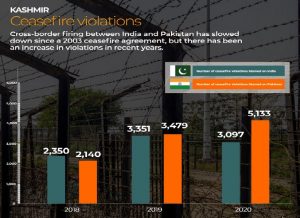 Following the January meeting, India and Pakistan announced they would stop cross-border shooting along the Line of Control (LoC) dividing Kashmir which has left dozens of civilians dead and many others maimed. That ceasefire is holding, military officials in both countries said.
Following the January meeting, India and Pakistan announced they would stop cross-border shooting along the Line of Control (LoC) dividing Kashmir which has left dozens of civilians dead and many others maimed. That ceasefire is holding, military officials in both countries said.
Both sides have also signaled plans to hold elections on their sides of Kashmir this year as part of efforts to bring normality to a region riven by decades of bloodshed.
The two have also agreed to dial down their rhetoric, the people Reuters spoke to said.
This would include Pakistan dropping its loud objections to Modi abrogating Kashmir’s autonomy in August 2019, while New Delhi in turn would refrain from blaming Pakistan for all violence on its side of the LoC.
These details have not been previously reported. India has long blamed Pakistan for the revolt in Indian-administered Kashmir, an allegation denied by Pakistan.
“There is recognition there will be attacks inside Kashmir, there has been discussions as to how to deal with it and not let this effort derailed by the next attack,” one of the people Reuters talked to said.
There is as yet, however, no grand plan to resolve the 74-year-old Kashmir dispute. Rather both sides are trying to reduce tensions to pave the way for a broad engagement, all the people Reuters spoke to said.
“Pakistan is transiting from a geostrategic domain to a geo-economic domain,” Raoof Hasan, a special assistant to Pakistani Prime Minister Imran Khan, told Reuters.
“Peace, both within and around with its neighbors, is a key constituent to facilitate that.”
Meanwhile, The French embassy in Pakistan has advised all French nationals and companies to temporarily leave the country, after violent protests by a far-right party that has accused French President Emmanuel Macron of committing “blasphemy”.
A French embassy official, speaking on condition of anonymity, confirmed the development to media on Thursday.
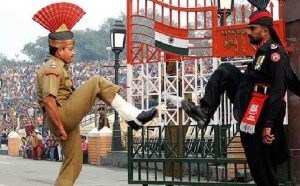 “I confirm that, due to the situation in Pakistan, we have advised the French citizens and companies to leave the country temporarily,” the official said.
“I confirm that, due to the situation in Pakistan, we have advised the French citizens and companies to leave the country temporarily,” the official said.
A second French official said that while the embassy in the Pakistani capital Islamabad would remain open, some staff would also be leaving the country.
The AFP news agency, based in France, quoted an email sent to French citizens in Pakistan advising them to leave.
“Due to the serious threats to French interests in Pakistan, French nationals and French companies are advised to temporarily leave the country,” the embassy said in the email, AFP reported.
“The departures will be carried out by existing commercial airlines.”
Pakistan’s foreign ministry did not immediately respond to media’s request for comment regarding Thursday’s developments.
Anti-France sentiment has been at the centre of the far-right Tehreek-e-Labbaik Pakistan (TLP) party’s messaging since it held protests last November against comments by Macron that were deemed by many, including Pakistan’s Prime Minister Imran Khan, to be “encouraging Islamophobia”.
Those protests were quelled after the TLP reached an agreement with the Pakistani government to put the question of expelling the French ambassador, boycotting all French goods and taking other steps before Parliament.
This week, however, violent protests broke out across the country when the government arrested TLP chief Saad Rizvi in what appeared to be a preemptive move ahead of the expiry of a TLP-issued April 20 deadline for the expulsion of the French envoy.
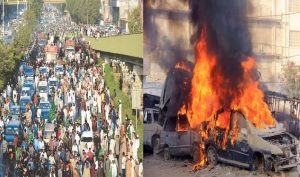 At least two policemen have been killed and hundreds of policemen and protesters were wounded in clashes at the nationwide demonstrations.
At least two policemen have been killed and hundreds of policemen and protesters were wounded in clashes at the nationwide demonstrations.
Large rallies were held in Karachi, Pakistan’s largest city, the eastern city of Lahore, near the capital Islamabad, and elsewhere.
Major intercity highways and roads were closed for much of Monday and Tuesday as the protests and clashes continued. Police fired water cannon, tear gas and rubber bullets to disperse the protesters in some areas.
On Wednesday, interior minister Sheikh Rasheed said the government had cleared most protests and was moving to ban the TLP under anti-terrorism legislation.
The November protests followed Macron’s support for the right to republish cartoons depicting Prophet Muhammad, considered “blasphemous” by many Muslims.
The caricatures in question are also viewed by many as Islamophobic, as they often link the faith to “terrorism”.
Blasphemy is a sensitive subject in Pakistan, where insulting Islam’s prophet, holy book or other religious personages are crimes that can carry the death penalty.
Increasingly, blasphemy allegations have led to violence by mobs or targeted attacks, with at least 78 people killed in such violence since 1990.
In the latest such incident, Taqi Shah, a religious scholar belonging to the minority Shia Muslim sect was axed to death in the town of Jhang in March after being accused of committing “blasphemy”.
 Pressmediaofindia
Pressmediaofindia
